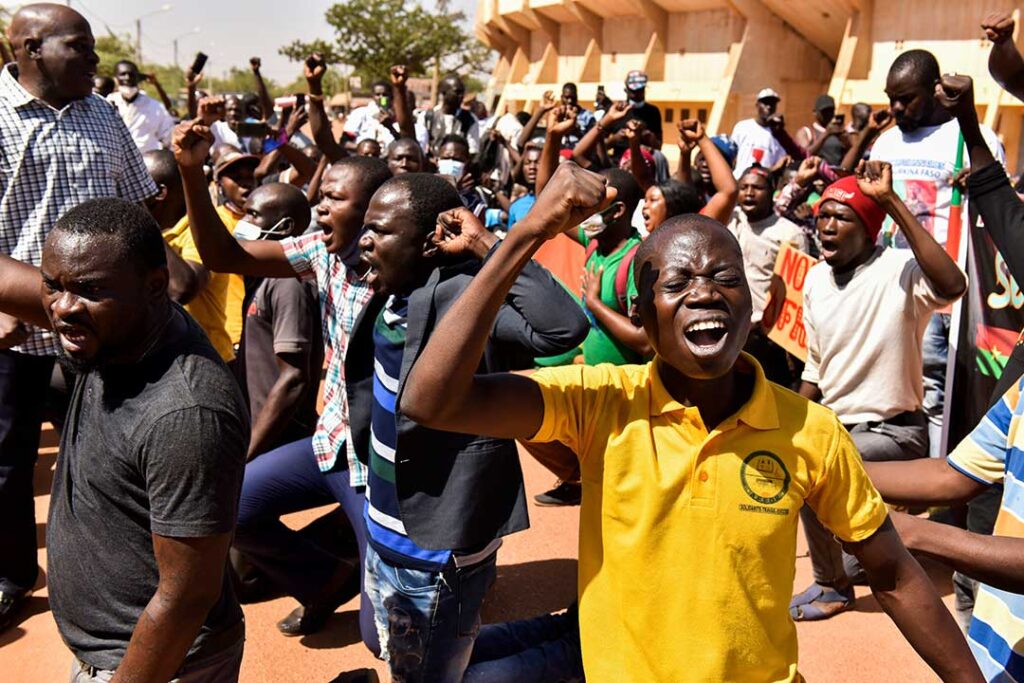ADF STAFF
Insurgents killed about 100 people, mostly children and the elderly, in the northern Burkina Faso village of Zaongo in early November.
A local prosecutor said the assailants were unknown, but rebel groups linked to al-Qaida and the Islamic State group (IS) operate in the area.
For months, those groups have committed war crimes against civilians and blocked access to food and water in 46 localities, Amnesty International reported. Attacks commonly occur in areas controlled by terrorist groups, an estimated 30% of Burkina Faso.
“These days, a town or village falls under siege every day,” the leader of a civil society organization told Amnesty International. “Arbinda has been under siege since 2019. The situation is similar in Gorgadji, Sollé, Mansila and Titao and there are real risks for the inhabitants.”
Violence across the nation has increased in recent years. Burkina Faso recorded 1,135 deaths attributed to terrorists in 2022, a 50% increase over 2021, according to a Global Terrorism Index 2023 report released in March.
Since the military coups in January and September 2022, the number of people killed by “militant Islamist violence” nearly tripled compared to the 18-month period before the January coup, according to the Africa Center for Strategic Studies.
The Ansaroul Islam extremist group in particular has ramped up attacks against civilians in recent years.
“At the beginning, they [Ansaroul Islam combatants] were only targeting soldiers but since the arrival of volunteers from neighboring communities in Djibo, less than a year ago, they are much more assertive and target civilians too,” one interviewee told Amnesty International. “These volunteers arrived around the harvest season in 2021. They are mostly displaced persons from Pobe-Mengao, Nassoumbou, Belehede and some people from Djibo.”
Responses by the Burkinabé military and the Volunteers for the Defense of the Homeland (VDP), a civilian force, sometimes heighten threats to civilians.
In November 2022, the Burkinabé forces attacked Holdé, a village near Djibo that was controlled by Ansaroul Islam. During the attack, fighters on vehicles and motorbikes descended on the village and killed at least 49 people, mostly women and children, according to survivors interviewed by Amnesty International.
Ansaroul Islam and other extremist groups often target areas where residents support the VDP.
In June 2022, a VDP post in Seytenga, a village about 10 kilometers from the Niger border, was evacuated by the military after an IS attack killed nine gendarmes.
The next day, IS fighters surrounded the village. Gunmen went house to house, indiscriminately shooting men dead. More than 86 people, mostly civilians, were killed during the attack, which lasted nearly 14 hours.
“The assailants were numerous,” a survivor told Amnesty International. “Around 9 p.m., they stopped shooting to chase away the animals and came back to loot the stores in Seytenga. I lived in Ouro Loumo and lost six relatives. Boubacar Soria was killed in front of my 11-year-old son. He was driving a tricycle with his apprentice. The child says they were shot, and they ducked. I’m traumatized.”
Residents in besieged areas say the terrorist groups also steal livestock, block trade routes, attack aid convoys, and destroy bridges and water infrastructure without consequence. These are critical threats in a nation where 4.9 million people need humanitarian aid, according to the United Nations Office for the Coordination of Humanitarian Affairs.
Some IDPs told Amnesty International that the Djibo Market, once one of West Africa’s best known and most important livestock markets, was “completely dead,” Ousmane Diallo, a researcher with the organization’s West and Central Africa office, said during a November news conference.
“There are no products left,” Diallo said. “There’s nothing left to buy, there’s nothing left to sell. Even if a resident of Djibo had money, it would be very difficult to buy food because the market is completely unsupplied.”
Terrorist groups also prohibit communities from farming or accessing pastures. In some areas, residents resort to eating wild leaves.
“Recently, as rice became rarer, we had to eat only the oulo leaves,” another IDP told Amnesty International. “These leaves were for poorer people before the siege, but now they are a common staple and it’s even hard to find them in the wild.”
In many areas, insurgents also have established checkpoints on main traffic routes and set improvised explosive devices to limit traffic.
Due to the conflict, more than 370 health centers have been closed since June, affecting medical access for 3.5 million people, Amnesty International reported.

